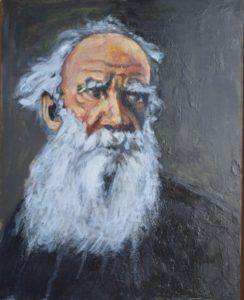Leo Tolstoy Archive
Written: 1856
Source: Text from TheAnarchistLibrary.org
Transcription/Markup: Andy Carloff
Online Source: RevoltLib.com; 2021

And it really was the count. When he heard the girl’s cry and a husky sound from the watchman behind the fence, who had been roused by that cry, he rushed headlong across the wet dewy grass into the depths of the garden feeling like a detected thief. “Fool that I am!” he repeated unconsciously, “I frightened her. I ought to have aroused her gently by speaking to her. Awkward brute that I am!” He stopped and listened: the watchman came into the garden through the gateway, dragging his stick along the sandy path. It was necessary to hide and the count went down by the pond. The frogs made him start as they plumped from beneath his feet into the water. Though his boots were wet through, he squatted down and began to recall all that he had done: how he had climbed the fence, looked for her window, and at last espied a white shadow; how, listening to the faintest rustle, he had several times approached the window and gone back again; how at one moment he felt sure she was waiting, vexed at his tardiness, and the next, that it was impossible she should so readily agreed to a rendezvous; how at last, persuading himself that it was only the bashfulness of a country- bred girl that made her pretend to be asleep, he went up resolutely and distinctly saw how she sat but then for some reason ran away again and only after severely taunting himself for cowardice boldly drew near to her and touched her hand.
The watchman again made a husky sound and the gate creaked as he left the garden. The girl’s window was slammed to and a shutter fastened from inside. This was very provoking. The count would have given a good deal for a chance to begin all over again; he would not have acted so stupidly now.... “And she is a wonderful girl — so fresh — quite charming! And I have let her slip through my fingers.... Awkward fool that I am!” He did not want to sleep now and went at random, with the firm tread of one who has been crossed, along the covered lime-tree avenue.
And here the night brought to him all its peaceful gifts of soothing sadness and the need of love. The straight pale beams of the moon threw spots of light through the thick foliage of the limes onto the clay path, where a few blades of grass grew or a dead branch lay here and there. The light falling on one side of a bent bough made it seem as if covered with white moss. The silvered leaves whispered now and then. There were no lights in the house and all was silent; the voice of the nightingale alone seemed to fill the bright, still, limitless space. “O God, what a night! What a wonderful night!” thought the count, inhaling the fragrant freshness of the garden. “Yet I feel a kind of regret — as if I were discontented with myself and with others, discontented with life generally. A splendid, sweet girl! Perhaps she was really hurt.... “ Here his dreams became mixed: he imagined himself in this garden with the country-bred girl in various extraordinary situations. Then the role of the girl was taken by his beloved Mina. “Eh, what a fool I was! I ought simply to have caught her round the waist and kissed her.” And regretting that he had not done so, the count returned to his room.
The cornet was still awake. He at once turned in his bed and faced the count.
“Not asleep yet?” asked the count.
“No.”
“Shall I tell you what has happened?”
“Well?”
“No, I’d better not, or ... all right, I’ll tell you — draw in your legs.”
And the count, having mentally abandoned the intrigue that had miscarried, sat down on his comrade’s bed with an animated smile.
“Would you believe it, that young lady gave me a rendezvous!”
“What are you saying?” cried Polozov, jumping out of bed.
“No, but listen.”
“But how? When? It’s impossible!”
“Why, while you were adding up after we had played preference, she told me she would be at the window in the night and that one could get in at the window. There, you see what it is to be practical! While you were calculating with the old woman, I arranged that little matter. Why, you heard her say in your presence that she would sit by the window tonight and look at the pond.”
“Yes, but she didn’t mean anything of the kind.”
“Well, that’s just what I can’t make out: did she say it intentionally or not? Maybe she didn’t really wish to agree so suddenly, but it looked very like it. It turned out horribly. I quiet played the fool,” he added, smiling contemptuously at himself.
“What do you mean? Where have you been?”
The count, omitting his manifold irresolute approaches, related everything as it had happened.
“I spoiled it myself: I ought to have been bolder. She screamed and ran from the window.”
“So she screamed and ran away,” said the cornet, smiling uneasily in answer to the count’s smile, which for such a long time had had so strong an influence over him.
“Yes, but it’s time to go to sleep.”
The cornet again turned his back to the door and lay silent for about ten minutes. Heaven knows what went on in his soul, but when he turned again, his face bore an expression of suffering and resolve.
“Count Turbin!” he said abruptly.
“Are you delirious?” quietly replied the count. “What is it, Cornet Polozov?”
“Count Turbin, you are a scoundrel!” cried Polozov and again jumped out of bed.